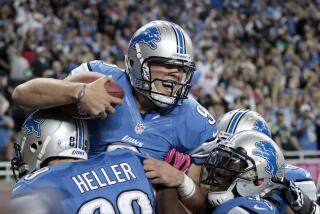Detroit Will Have to Make Do With a No-Knox Engine
- Share via
If Charles Robert (Ground Chuck) Knox should ever write his biography, the working title should be, “Nobody Ever Called Me Genius.” Or, “What Does a Guy Have to Do to Get in That Club?”
A genius in football is a guy who can take the best set of players in the league and beat the next-best, 20-17. Someone once said: “Genius is not getting any kicks blocked.”
When Chuck Knox came to the Rams as head coach in 1973, he didn’t even look at the contract owner Carroll Rosenbloom thrust at him. That’s the way C.R. liked his coaches--barefoot and pregnant, so to speak.
Five years later, after having coached the team to five straight division titles and three conference championship games, Knox was kind of tired of making the beds and doing the dishes, so to speak. He took a long, hard look at the contract.
It was kind of like the meeting between Sam Goldwyn and George Bernard Shaw. Goldwyn talked glowingly of bringing Shaw’s great works of art to the world but haggled on terms. Finally, Shaw, impatient, growled, “That’s the difficulty, Mr. Goldwyn. You’re interested in art, but I’m interested in money.”
Knox was interested in money, C.R. wanted to talk art--specifically about Knox’s habit of winning games the old-fashioned way, by earning them. C.R. thought the team’s stodgy style was putting a crimp in his image. Knox thought C.R. had wanted victories, not Hollywood musicals.
C.R. had a way of keeping unhappy coaches in line. “Unhappy coaches can get happy at Green Bay or Buffalo,” he’d threaten.
When Billy Clay Ford, sole owner of the Detroit Lions came a-courting, C.R. feigned indifference. Chuck Knox could go to Detroit, he ruled. All he would require were seven players picked from a pool of 14 on the Detroit roster. Knox could go to the Lions if the Lions came to Los Angeles.
C.R. then let Knox go to Buffalo for nothing because Buffalo didn’t have seven players who could have made the Rams. They didn’t have seven players who could have made Yale.
Knox turned that program around, too. Buffalo had gone 2-12 and 3-11 just before Knox got there. Within two years, the Bills were in the playoffs, attendance was up from 248,413 at home to 601,702, and Knox had pulled the coup of the year, getting rid of O.J. Simpson and his swollen contract--$900,000--for four draft choices, and “We did not have to eat a penny of his contract.”
Still, owner trouble loomed again. Buffalo owner Ralph Wilson began losing draft choices to Canada and All-Pro choices to the new USFL. Knox began looking around for an escape hatch. Not even a genius can win if his team has a hole in it.
Knox went to Seattle, which had lots of holes in it. Once again, he put a team through the school of hard Knox. It became a disciplined, hard-hitting, cerebral team, stingy on defense, cautious on offense. As a team, it was like a banker: It dipped into the capital only when it had to. It beat you off the interest.
It got to the playoffs instantly--in fact, all the way to the conference championship game, where it lost to the Raiders. Knox was the greatest thing to hit Seattle since the umbrella.
Once again, Billy Clay Ford hove on the scene. It had been a major source of annoyance to the Ford family of fine cars that the Detroit Lions kept turning out like the Edsel.
Coach-stalking in the NFL is a complicated ritual, like a mating dance in the Congo. You mustn’t touch or get caught looking at your intended, but your movements make your intent clear. There are rules against tampering, but there are rules against other forms of adultery, too. Besides, Ford is not only a league owner but a league advertiser, too.
The last time William Clay Ford had come a-wooing, Chuck Knox had wound up in Buffalo. So, he had to be careful this time or he might find himself in Jakarta. Combing the beaches, waiting for the copra boat.
The word soon went out that Ford wanted more than a coach. He wanted a partner. He was dangling 5% of the franchise.
Now, any coach worth his hire hankers to be an owner, too. For one thing, franchises are going for $80 million and up these days.
The Seattle franchise is owned by the Nordstrom department store family and a passel of minority shareholders, so there was no 5% hanging around loose to be thrown on the bargaining table. Chuck would have to remain just a hired hand.
At $750,000 per and up, that’s hardly sharecropping, but the Nordstroms did have one strong bargaining advantage--a contract. Neither Ford nor Knox, being men of probity, wanted to contest the sanctity of a man’s word.
So, maybe genius is not X’s and O’s, after all. Maybe it’s having two or more of America’s most powerful families pulling at you. Maybe it’s being a guy who kept even Carroll Rosenbloom sitting up nights plotting to keep you. Maybe it’s being wanted by the automotive family that let Lee Iacocca go with a shrug but would name a new car after you (the Chuck Wagon?) if you would join the firm.
If that’s not genius, neither was Mozart.
More to Read
Go beyond the scoreboard
Get the latest on L.A.'s teams in the daily Sports Report newsletter.
You may occasionally receive promotional content from the Los Angeles Times.










